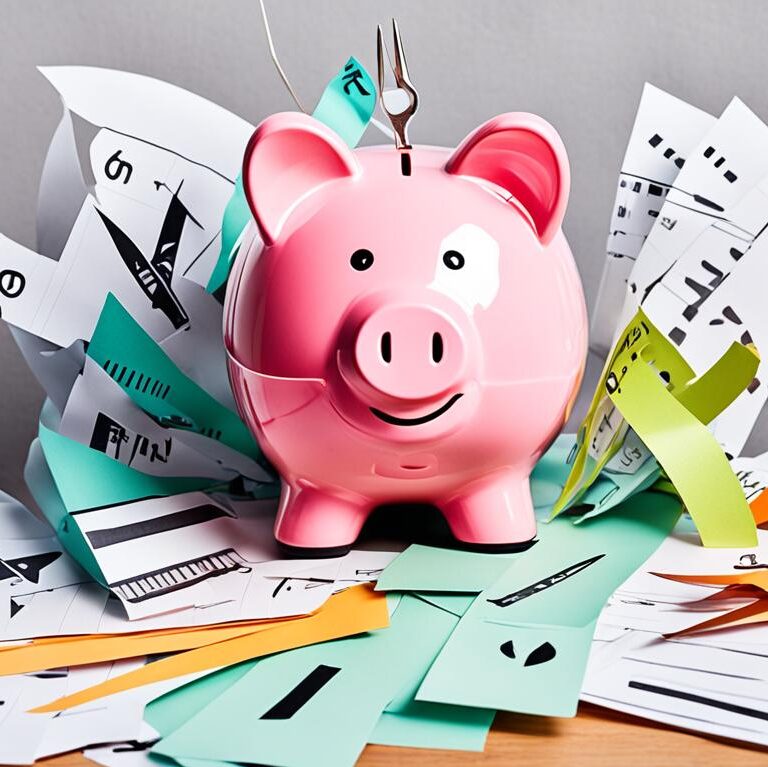“As an Amazon Associate I earn from qualifying purchases.”
Do you remember feeling unsure when the last recession hit? News of economic downturns made many of us lose sleep. We worried about keeping our jobs, paying higher prices, and watching our savings diminish. But it’s important to know that opportunities exist in tough times. During recessions, you can protect your money and find financial chances.
Recessions, like the one in 2020 from COVID-19, show us how fragile the economy can be. They happen for many reasons, including financial crises and inflation. These tough times can last for months or even years, affecting your money directly. But focusing on financial wellness can help you succeed even when times are hard.
Having an emergency fund is key, say the experts. This fund should cover your expenses for three to six months. It acts as a safety net during hard times. Also, finding new ways to earn money is crucial. Consider recession-proof income ideas like earning from dividends, interest, and renting out property. These strategies can turn financial challenges into opportunities.
Starting a business during a recession might sound risky, but it can work out. Look at Ely Khakshouri’s success with Retrospec. Understanding market shifts can open doors to growth. Investing in things that hold their value, like bonds and mutual funds, can provide income when the economy slows down. For example, bonds often do better than stocks in recessions, and companies selling daily essentials often outperform the market.
You don’t have to figure things out alone; financial advisors are there to help. The main goal is to have a strong financial plan that can withstand a recession. With the right approach, an economic downturn can be a chance to protect and grow your wealth.
Key Takeaways
- Having an emergency fund with three to six months of living expenses is crucial for financial resilience during a recession.
- Exploring recession-proof income ideas such as passive income through dividends, interest, and real estate rentals can provide financial stability.
- Starting a new business during a recession can present unique market opportunities, as evidenced by the success of Retrospec.
- Investing in resilient assets like consumer staples, bonds, and mutual funds can help maintain financial stability during downturns.
- Seeking advice from financial advisors can be invaluable in navigating economic uncertainties and developing effective financial plans.
Understanding a Recession
A recession means the economy is shrinking for a while, like when a country’s money-making (GDP) goes down. In early 2022, for example, the U.S. had a decrease in GDP for two quarters straight. This matched the basic definition of a recession.
Many things can lead to a recession, like money crises, issues with getting goods, rising prices, and high interest rates. It’s important to understand these causes to plan for the future. A recession, as defined by the experts, is when the economy slows down for many months, affecting the whole country. This slowdown means more people without jobs, falling stock prices, less business activity, and people spending less money.
Economies grow and shrink in cycles, but not all parts feel it the same way. Stocks in areas like utilities and necessities might not drop as much during tough times. And companies that make steady money from subscriptions can also be safer choices during these downturns.
During a recession, smart investing strategies become crucial. One method is dollar-cost averaging, which helps buy more shares when prices are low. Studies show that active fund managers often do well in these times, beating others by a significant margin. Looking into bonds, especially the safer investment-grade ones, is also wise as they usually perform well when the stock market doesn’t.
Investing in uncommon assets like royalties or insurance-linked securities could be smart since they’re not tied to the usual market ups and downs. Also, businesses that sell must-have goods and services, like food, hygiene products, and healthcare, tend to stay strong even when the economy doesn’t.
It’s crucial to remember that different sectors and businesses react differently to a recession. Big companies with little debt, strong finances, and steady cash flow might actually do well. Choosing investment options like ETFs and low-cost index funds can be safer. Plus, stocks that pay dividends offer regular income, which can help smooth out market bumps and are signs of well-run companies.
For tips on getting ready for a recession, check out this resource.
Cutting Living Expenses
During tough economic times, it’s important to look at our living expenses. Making a budget and sticking to it can help us live more financially stable. We should start by focusing on what we need and cut back on extra spending. This article will share different ways to save money and manage living costs better.
Reevaluate Your Budget
Begin with creating a budget that includes all your monthly costs. This includes checking how much money comes in from jobs, investments, and any extra work. Also, split your costs into what you need and what you can live without.
Try using the 50/30/20 rule: 50% for needs, 30% for wants, and 20% for savings. This helps in cutting down extras and better managing money. It’s smart to hold off big buys and save or pay off debts when money is tight. For more on how recessions affect spending, check out this detailed guide.
Reduce Non-Essential Spending
For cutting back on non-essentials, think about stopping services you don’t often use. This might be things like gym, streaming or magazine subscriptions. Eating at home instead of dining out can also save a lot of money.
- Cheaper Insurance: Look around for insurance that offers what you need but costs less.
- Utility Savings: Save energy by using efficient appliances and setting thermostats wisely.
- Alternatives to Dining Out: Plan your meals, take advantage of grocery sales, and cook in bulk.
These strategies help keep your finances in check during hard times.
Finding Substitutes for Products and Services
Looking for less expensive options for products and services is key. Choose generic over name brands. The quality is often the same but at a lower price. For entertainment, try free stuff like public libraries, local events, or online resources.
Below is a table to help compare costs and find cheaper options:
| Category | Premium Option | Affordable Substitute |
|---|---|---|
| Groceries | Brand Name Products | Generic Brands |
| Entertainment | Movie Theaters | Streaming Services, Libraries |
| Dining | Restaurants | Home-cooked Meals |
| Insurance | Comprehensive Plans | Cheaper Policy Alternatives |
With these tips and a solid budget, you can navigate through tough times and strengthen your financial health.
Building an Emergency Fund
In these shaky economic times, having an emergency fund is key to financial safety. It acts like a lifesaver when money gets tight, helping you handle sudden hardships.
Importance of Saving During Prosperous Times
Saving when money’s good is smart. Experts recommend saving 3 to 6 months’ living costs for tough times. This way, you won’t have to dip into investments or rack up debt in a crunch. Saving now supports your future financial dreams and keeps you steady, no matter the market.
Setting Financial Goals
Knowing your financial goals is vital for saving. Try to save 6 to 9 months’ worth of must-haves. Tools for budgeting and calculators for saving help you figure out your goals. Setting a clear savings goal boosts your drive and discipline, leading to financial wellness.
Allocating Monthly Income to Savings
Putting a part of your income into savings every month is a smart move. Following the 50/30/20 rule works well: 50% on needs, 30% on wants, and 20% into savings. Setting up auto-transfers to savings makes it easy to keep your emergency fund growing.
- Essentials: 50%
- Wants: 30%
- Savings: 20%
With costs going up, it pays to cut down on extras like eating out and trips. Being strict about spending more on savings than on non-essentials boosts your financial safety net.
Building an emergency fund is vital, more so in good times. It’s not just a buffer for bad times but a step towards full financial security.
Developing New Skills
In today’s tough job market, learning new skills or improving what you already know is key. Online education offers easy, affordable ways to learn and stay ahead in a changing job scene.
Online Education Resources
Technology brings many online learning chances to you. Sites like Coursera, Udemy, and LinkedIn Learning have courses on many topics, like coding or digital marketing. These can help you change careers or stand out in a tough job market. Also, creating an emergency fund through smart money planning can help you during tough times.
Practical Skills to Learn
It’s important to know which skills can boost your job chances. Skills in coding, graphic design, digital marketing, and creating content are sought-after. Freelance designers and developers can make good money per hour. Learning these online can boost your earnings and protect you financially.

Enhancing Your Current Skillset
Bettering your existing skills can also help a lot. Taking online courses keeps you ahead in your field and opens new chances. For instance, improving softer skills like talking well, negotiating, and leading can make you more flexible in a tight job market. A huge 85% of jobs are found through knowing people, which shows why it’s key to have a solid network.
| Generational Side Hustle Statistics | Percentage | Average Monthly Income |
|---|---|---|
| Gen Zers | 53% | $810 |
| Millennials | 50% | $1,022 |
| Gen Xers | 40% | $810 |
| Baby Boomers | 24% | $810 |
Using online learning and focusing on in-demand, flexible skills can help you through uncertain times. This way, you can keep an edge in the recession job market.
Ways to make money in a recession
In tough times, finding ways to make money can be hard. But, you can still make money during a recession by exploring smart business ideas and investing wisely. Creating streams of income that can withstand economic downturns is key.
Starting businesses that can survive a recession is a great strategy. Areas like healthcare, utilities, grocery stores, and essentials often remain in demand. Companies such as General Mills, Kellogg, and Campbell Soup usually do well in such times.
Jobs in accounting, public safety, and waste management also offer stable money because they are always needed. Taking on gigs like freelancing or consulting can pay off too.
Having a diverse set of investments can protect you from the ups and downs of the economy.
When investing, consider bonds and stocks that pay dividends. Real estate, including rental properties and storage units, can give you passive income plus tax benefits. Using services like Friend With A or Loanables to rent out your things, like trailers or bikes, can also bring in extra cash.
It’s also smart to build a safety net and cut down on spending. Experts say saving up to 24 months of living costs can help during a recession. Saving money by buying in bulk or choosing generic brands can keep you financially secure.
Boosting your skills and value through education and training is wise. This can make finding work easier during tough economic times. Normally, a recession lasts about 15 months, so it’s crucial to prepare early for financial survival.
Creating Passive Income Sources
In times of economic ups and downs, creating passive income can offer financial security. Diversification into different income streams can protect your money. Here’s how to make passive income when the economy is tough.
Investing in Dividend Stocks
One smart move is investing in dividend-paying stocks. Companies like Johnson & Johnson and Procter & Gamble pay dividends regularly. This provides investors with a continuous stream of income. During economic downturns, the average return on investment from these stocks is impressive. They often give better returns than other types of investments.

Real Estate Rentals
Real estate is another great way to earn passive income. By owning rental properties, you get monthly income from your tenants. The median passive income from rental properties stays consistent, even in tough times. Plus, investing in real estate increases your wealth over time, as the property’s value goes up.
Peer-to-Peer Lending
Platforms like LendingClub and Prosper offer peer-to-peer lending. This lets you lend money to others outside of traditional banks. It’s a way to earn more than what banks or bonds typically offer. So, it’s a great choice for passive income in a recession. The number of people using these platforms has increased, showing their growing appeal.
Starting a Recession-Proof Business
Starting a business that can withstand an economic downturn is smart for new entrepreneurs. It’s important to find what the market needs, go for affordable start-up ideas, and use online spaces. These steps are key for success.
Identifying Market Needs
Knowing what consumers want and the latest trends is crucial. Entrepreneurs like Ely Khakshouri from Retrospec succeeded by analyzing the market. Healthcare and global baby products are industries to watch. They’re expected to grow, showing they’re reliable even when the economy isn’t strong.
Low-Cost Start-Up Ideas
Creating a business with little money to start is possible. Look at online reselling, which could reach $77 billion in five years. There’s also growth expected in financial advising and online learning. The home improvement field is another area with high value.
Utilizing Online Marketplaces
Using online platforms to start and grow your business saves money. E-commerce saw a 43% jump in sales during the pandemic. This shows the strength of online selling. Entrepreneurs can offer things like consulting, e-learning, and home improvement online. This way, they save on costs and reach more customers, even when times are tough.
Investing in Bonds and Mutual Funds
When the economy slows down, many investors move from equity funds to bonds and mutual funds. Bonds offer fixed incomes over the long term and do better than stocks during tough times. This makes them less risky.
Benefits of Bond Investments
Federal bond funds are chosen by investors who avoid risks. This is because the government can tax or print money, lowering the chance of not getting paid back. Municipal bonds from state and local governments are also safe, even though they’re a bit riskier than federal ones. Yet, taxable corporate bonds offer more income but have more risk, especially the top-quality ones.
Choosing the Right Mutual Funds
In uncertain times, mutual funds are a good choice. They have a variety of investments and are managed by experts. Funds focusing on utilities and consumer staples invest in firms with steady dividends. This is safer. Large companies are usually less affected by bad economic times than small ones, making large-cap stock funds a stable choice.
Portfolio Diversification Strategies
Spreading your investments between bonds and mutual funds reduces risk. Adding different types, like hedge funds, can safeguard your money. Hedge funds might be risky, but they can earn money no matter the market. Include funds that do well when the market is down, but only a bit. Such wise diversification helps lower risks and protects your assets during downturns.
FAQ
What are some recession-proof income ideas?
How do economic downturns affect market economies?
How can I reassess my living expenses during a recession?
Why is it important to save during prosperous times?
What practical skills are valuable to learn during a recession?
What are some ways to make money during an economic downturn?
How can I generate passive income during a recession?
What are some low-cost start-up ideas during a recession?
What are the benefits of investing in bonds during a recession?
“As an Amazon Associate I earn from qualifying purchases.”

